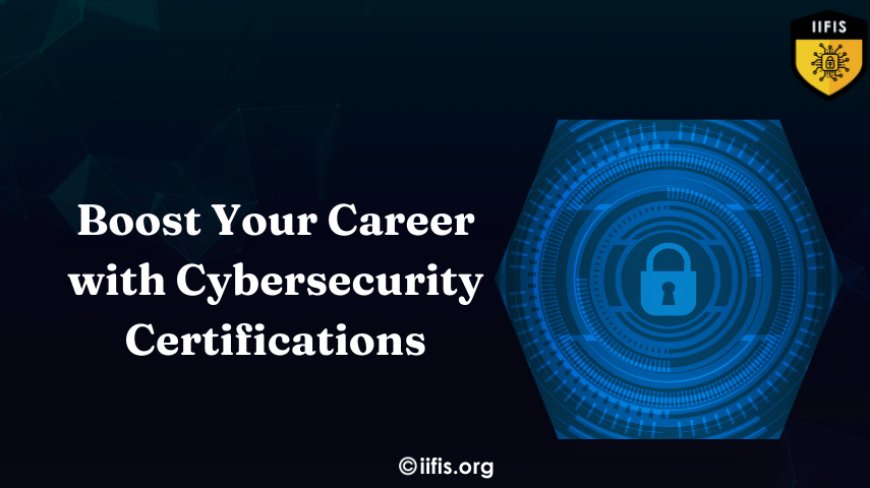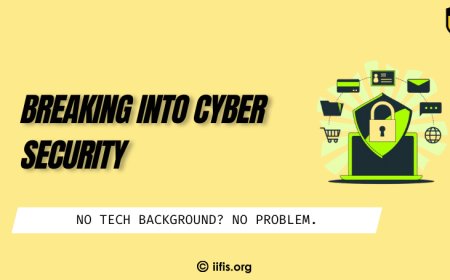Boost Your Career with Cybersecurity Certifications
Unlock new career opportunities and boost your earning potential with cybersecurity certifications. Learn how these credentials can validate your skills, enhance job prospects, and keep you competitive in the tech industry.

cybersecurity is one of the most important and growing fields. If you’re looking to start or advance your career in this area, certifications can make a big difference. Cybersecurity certifications show that you have the technical skills and the commitment to stay updated in a constantly changing field. In this blog, we’ll look at how these certifications can boost your career, open up new job opportunities, and help you get noticed by employers. Whether you’re a beginner or aiming for higher-level positions, the right certifications can help you achieve your career goals and build a strong future.
The Growing Importance of Cybersecurity
-
Rising Cyber Threats
-
Cybersecurity threats are increasing globally, affecting individuals, businesses, and governments.
-
The rise in data storage and online activity provides more opportunities for attackers.
-
High-profile data breaches and ransomware attacks are becoming more common.
-
New hacking techniques constantly emerge, putting sensitive information at risk.
-
Skilled professionals are essential for building strong defenses and responding to incidents.
-
High Demand for Cybersecurity Experts
-
Job growth in cybersecurity is outpacing most other professions.
-
Thousands of positions remain unfilled due to a widening skills gap.
-
Certifications and experience open up more job opportunities.
-
Cybersecurity professionals enjoy higher salaries and better job security.
-
Demand for experts is expected to grow as technology continues to evolve.
Key Cybersecurity Certifications to Consider
-
Top Entry-Level Certifications
-
CompTIA Security+: A great starting point for beginners, this certification covers essential topics such as network security, risk management, and cryptography. It is widely recognized and helps establish foundational cybersecurity skills.
-
Certified Ethical Hacker (CEH): This certification is perfect for those looking to understand the mindset of attackers. CEH focuses on identifying and exploiting vulnerabilities in systems, teaching ethical hacking and penetration testing practices.
-
Advanced-Level Certifications
-
CISSP (Certified Information Systems Security Professional): One of the most respected certifications in the field, CISSP demonstrates a deep understanding of cybersecurity principles and best practices. It is ideal for those with several years of experience aiming for roles like security analyst, consultant, or architect.
-
CISM (Certified Information Security Manager): This certification is tailored for professionals who want to move into management roles. It emphasizes information risk management, governance, and developing and managing information security programs.
-
Other Advanced Certs: Certifications like Certified Information Systems Auditor (CISA) and Certified Cloud Security Professional (CCSP) are also valuable for those looking to specialize in auditing or cloud security, respectively.
-
Specialized Certifications
-
Offensive Security Certified Professional (OSCP): A highly regarded certification for those interested in penetration testing and ethical hacking. OSCP requires hands-on testing and challenges professionals to demonstrate practical skills in real-world scenarios.
-
Certified Information Systems Auditor (CISA): This certification is valuable for those who specialize in auditing and managing information systems, ensuring their effectiveness and security.
-
Certified Cloud Security Professional (CCSP): For professionals looking to specialize in cloud security, CCSP covers cloud architecture, governance, and compliance.
These certifications can guide your career at different stages, whether you're starting out, advancing to higher roles, or focusing on specialized areas in cybersecurity.
Benefits of Cybersecurity Certifications
-
Demonstrating Verified Expertise
-
Certifications act as proof that you have the necessary knowledge and skills in cybersecurity.
-
They show employers that you have met industry standards and can handle real-world challenges effectively.
-
Earning certifications ensures that your expertise is recognized by peers, clients, and employers, enhancing your professional credibility.
-
Expanding Job Opportunities
-
Certifications make you more attractive to potential employers, broadening the range of positions you qualify for.
-
Many companies list certifications as a requirement or preference, giving certified candidates a competitive edge.
-
Higher-level certifications can open doors to advanced roles such as security manager, ethical hacker, or security architect.
-
Higher Earning Potential
-
Certified professionals often earn more than their non-certified counterparts. For example, data shows that holding certifications like CISSP or CISM can lead to salaries that are significantly higher than the industry average.
-
According to various industry reports, cybersecurity professionals with certifications can see salary increases of 10-20% compared to those without.
-
Specialized certifications, such as OSCP or CCSP, can lead to roles that offer higher pay due to their focused expertise and hands-on nature.
How Cyber Certs Enhance Your Professional Profile
-
Building Credibility and Trust
-
Cybersecurity certifications demonstrate that you have proven knowledge and skills in the field, which helps establish your credibility with employers and clients.
-
Certified professionals are seen as more reliable, as their expertise is validated by recognized standards.
-
Having certifications can reassure clients that they are working with someone who understands the complexities of cybersecurity and can be trusted to handle sensitive data securely.
-
Opening Doors to Networking Opportunities
-
Joining certification bodies or related professional organizations provides opportunities to connect with other cybersecurity experts.
-
Attending events, forums, and seminars hosted by these organizations can help you build valuable relationships in the industry.
-
Networking with peers and mentors can lead to collaboration, job referrals, and access to industry insights that can support career growth.
-
Staying Competitive in the Industry
-
Cybersecurity is constantly evolving, and certifications help professionals stay up to date with best practices and current threats.
-
Maintaining certifications often requires continuous learning and recertification, which encourages professionals to keep their skills sharp.
-
Being certified shows that you are committed to staying informed about industry changes, making you a stronger candidate for promotions and new roles.
Learning and Growth Beyond Certification
-
Practical Application of Certified Skills
-
Certifications provide hands-on knowledge that can be directly applied to tasks like configuring security protocols and analyzing threats.
-
Skills from certifications, such as CEH or OSCP, translate well into real-world scenarios like penetration testing.
-
Continuous Education and Recertification
-
Keeping certifications updated ensures your skills stay current in the evolving cybersecurity field.
-
Recertification or continuing education helps maintain relevance and professional growth.
-
Building a Career Roadmap
-
Certifications guide your career path, from entry-level (e.g., CompTIA Security+) to advanced roles (e.g., CISSP).
-
Specialized certs like OSCP or CCSP let you focus on areas like ethical hacking or cloud security.
Tips for Getting Started with Cyber Certs
-
Choosing the Right Certification
-
Pick certifications that align with your current experience. Start with CompTIA Security+ for beginners or pursue CISSP/CISM for advanced roles.
-
Specialized certs like OSCP fit those looking to focus on penetration testing.
-
Studying and Preparing
-
Create a study schedule, use practice exams, and join study groups for support.
-
Leverage online resources, tutorials, and practice platforms to enhance learning.
-
Balancing Certification with Work and Life
-
Plan study sessions that don’t disrupt work or personal life.
-
Break down study material into manageable parts and use time-blocking to stay organized.
-
Seek employer support if possible for additional resources and time.
These steps will help you efficiently pursue certifications and grow your cybersecurity career.
Cybersecurity certifications are a powerful investment for career growth, offering IIFIS: Improved job opportunities, Increased earning potential, Foundational and advanced skills, Industry credibility, and Staying current. These certifications validate your expertise, making you stand out to employers and clients while opening doors to higher-level roles. With certifications, you gain practical skills that you can apply directly to your job, ensuring you can confidently handle real-world challenges and contribute effectively to your team or organization.
Beyond career advancement, certifications demonstrate your commitment to continuous learning and staying up to date in a field that’s always changing. This ongoing growth helps you maintain industry relevance, making you a more competitive and trusted professional. Whether you’re just starting or looking to advance, investing in cybersecurity certifications sets the foundation for long-term success and career security.























